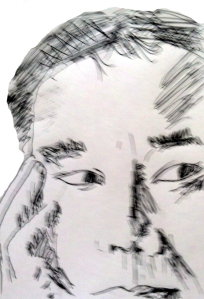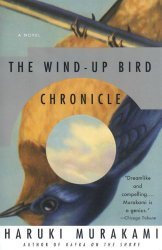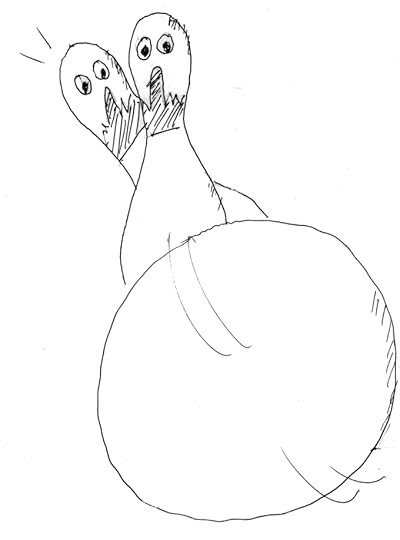Kurt Brindley's Blog, page 131
October 28, 2014
Defiance
Filed under: Photography Tagged: art, defiance, GIMP, graphic design, nature, nature photography, photo design, photo editing, photography, survivors








October 27, 2014
If I Were I Samurai
If I were a samurai
I would know
when to bow
and when to ignore
when to speak
and when to be silent
when to eat
and when to fast
when to think
and when to meditate
when to advance
and when to hold
when to strike
and when to parry
when to kill
and when to die
FOR MORE LIKE THIS >> CLICK CLICK
Filed under: Poetry Tagged: bushido, death, honor, Japan, meditation, obedience, poetry, samurai, seppuku, suicide, warriors, writing, zen








Literary Zen V
Filed under: Literary Tagged: art, author quotes, drawing, fiction, graphic art, graphic design, Haruki Murakami, literary quotes, Literary Zen, novels, quotes, writers, writing








He Ain’t No Oe But That Ain’t So Bad
BOOK | FICTION | LITERATURE
THE WIND-UP BIRD CHRONICLE
by Haruki Murakami
RATING: ★ ★ ★
Original review date: May 17, 2011

Haruki Murakami
Nobel Prize winning author Kenzaburo Oe is one of the few contemporary Japanese authors whose writing does what I believe Japanese literature — strike that — whose writing does what I believe all literature should do: that is, it should expose our fears and force us to confront them. Like a shamanistic bloodletting, literature should mercifully, but without mercy, cut deep into our consciousness in an effort to reveal and release, exorcise, the things in life that have come to possess us—-our loves, our hates, our envies, our disdains; and afterwards, when the demons are either gone or have regained control, after the blood stops flowing and the wound hardens into a gnawing, itchy scab, it, literature, then forever stays with us and occasionally reminds us of that which we have, if not overcome, then at least managed to suffer through, as the thickened scar forever reminds the wary survivor.
Yes, I expect much from literature.
Oe’s writing affects me as literature should. Though it has been many years since I have read his novels The Silent Cry and A Personal Matter, they both are still with me, haunting me.
While I have read far too few Japanese authors, it is impossible for me not to compare the writing of those authors whom I have read against Oe’s, since his is such a powerful force in my literary life.
It’s difficult, maybe impossible, to compare the writing of authors of different literary genres and subgenres. How does one effectively size up an Oe novel against a Basho haiku against a Miyazawa fairy tale?
Acknowledging such difficulties, I know we still like our “best of” lists so here is a somewhat rankish list of those few Japanese authors whom I have read, ordered based on the subjective impact their writings have left on me, on how deeply they cut into my consciousness, on how thick the scar they leave behind.
Kenzaburo Oe
Yukio Mishima
Matsuo Basho
Ryunosuke Akutagawa
Soseki Natsume
Yasunari Kawabata
Kenji Miyazawa
Haruki Murakami
Banana Yoshimoto
I love poetry and I consider myself a poet, but as a reader I am drawn mostly to the novel. So it’s no surprise to me that the list consists of those authors known primarily for their novels. Most of the authors are dead, but the three who are still with us bookend the list: Oe on top and Yoshimoto and Murakami at the bottom.
Though his name is listed next to last on the list — which doesn’t necessarily mean his writing is bad (although I do believe Yoshimoto is properly placed at the bottom as she is a less than good writer, especially when compared to Oe) — when discussing contemporary Japanese novelists, the first on the list to be discussed, even before Oe, at least in terms of international popularity and readership, is Haruki Murikami.
These days, Murakami’s work dominates Japan’s literary scene, and much of the international one, as well. From what I’ve learned about his work ethic his is a completely earned and deserved domination — when working on a novel he rises at 4:00am, writes for five to six hours, runs 10 kilometers, and is in bed by 9:00 pm; he rigidly sticks to this herculean writing process and daily routine until the novel is complete.
The Wind-Up Bird Chronicle is my first Murakami novel. In addition to the short story Town of Cats, it is the only work of his I have read.
is my first Murakami novel. In addition to the short story Town of Cats, it is the only work of his I have read.
I like THE WIND-UP BIRD CHRONICLE. I think it deserves to be as widely read as it has been. It is an intriguingly complex story with many layers, possessing much of what I like most about Japanese writing, and which, fortunately for me, is what most of what the Japanese writing that I have read is about: the sense of loneliness and despondency in the face of an ever more changing and complex world.
But it seems THE WIND-UP BIRD CHRONICLE is a bit too complex an effort with too many layers for Murakami to effectively manage.
The protagonist of the story, our non-hero, is Toru Okada, a still young but nearing middle age out of work lawyer. He is out of work by his own choosing, apparently because he has become disenchanted with his line of employment and his place in life. First he loses his cat, then his wife. During his quest for both, he finds and develops a relationship with a flirty teenager, with two sisters (one a prostitute of the mind whom he encounters in both his real and dreamed worlds, the other a prostitute of the flesh), a rich widow and her mute but spiritually communicative son, and a World War II veteran with a fantastically horrific yet achingly beautiful story to tell. To manage his downwardly spiraling and dangerously out-of-control and confusing life, Toru takes refuge within a deep well, which seems to be some sort of all consuming event horizon between his reality and his dreams.
Yeah, it’s as wild and mesmerizing and frustrating (often not in a good way) ride of a novel as it sounds.
My two biggest criticisms of Murakami’s novel are that it is too contrived and too insecure.
I know much of the story is fantastical and captured within a dream state, but it doesn’t feel natural. No matter how bizarre and far out crazy weird a story is it should still feel natural, as if that is exactly how life is meant to be. Some of my favorite novels are captured firmly within these realms; particularly Franz Kafka’s The Castle and The Trail.
We know that Murakami was greatly influenced by Kafka. So much so he entitles of one of his books Kafka on the Shore. But no matter how fantastical and surreal Kafka gets, his writing feels natural within those unnatural realms. Murakami’s does not. His feels choppy, forced, and, as I said before, contrived.
I also get impatient with Murakami’s lack of trust in us, the readers. This lack of trust may mean he is somewhat insecure in his own writing ability. He explains things too much. He leads us throughout the story with too much detail and suggestions as to the meaning behind what it is he wishes for us to learn from his words. Unlike Kafka who takes us blindfolded onto his bizarre journeys, abandones us deep within the remote wilderness of his unfinished tales, and leaves us to our own devices to find our way back to safety, Murakami has no such confidence in either us, himself, or both.
Maybe it’s overly descriptive because unconsciously he understood that the story was too ambitious and unmanageable for him to successfully convey.
Regardless what my criticisms are, THE WIND-UP BIRD CHRONICLE is an immense success. As testimony to its international appeal, an “interdisciplinary theatre production” based upon the novel premiered at the Edinburgh International Festival. Its trailer looks amazing and captures the essence and weirdness of the story.
In the end, Murakami’s THE WIND-UP BIRD CHRONICLE does not do for me what Oe’s The Silent Cry or A Personal Matter does. While it is surreal and sometimes dark and creepy in a soulful and insightful way that I mostly enjoyed, it has no staying power. If there has been any cutting from it, it has been bloodless and superficial. Ten years from now, I foresee the novel leaving no haunting or even memorable scars on my consciousness.
~~~~
Rating System:
★ = Unreadable
★ ★ = Poor Read
★ ★ ★ = Average Read
★ ★ ★ ★ = Outstanding Read
★ ★ ★ ★ ★ = Exceptional Read
Filed under: Reviews Tagged: authors, book reviews, books, fiction, Haruki Murakami, Japan, Japanese Literature, Kenji Miyazawa, Kenzaburo Oe, literature, reviews, The Wind-Up Bird Chronicles, writers








October 26, 2014
I’m not sure if I’m going to review the movie John Wick, but if I do I’ll probably title it…
“GUNS AND GUNS AND GUNS AND GUNS AND GUNS AND GUNS AND PUPPIES”
#therewerealotofgunsinthismovie
#alot
#andacoupleofreallycutepuppies
#lolnotevenonecat
#ilovethismovie
#damncats
FOR MORE LIKE THIS >> CLICK CLICK
Filed under: Movies Tagged: action movies, damn cats, guns, humor, John Wick, Keanu Reeves, movie humor, movie reviews, movies, puppies, titles, writing, writing humor








Wicked
*actual theater where movie was viewed
*john wick image from google images (enhanced for effect) (no hollywood i did not steal/take a picture of your movie)
FOR MORE LIKE THIS >> CLICK CLICK
Filed under: Photography Tagged: action movies, art, graphic art, graphic design, John Wick, Keanu Reeves, movie theaters, movies, photography, pictures








I don’t mean to make you jealous but…
As soon as I hit the “Publish” button on thisun here post, me and the fam are headin’ right outta thatun there door to our local Suburban Bowlerama bowling alley for some bowling extravaganza righteousness and then headin’ straight to the local movie theatre (complimentary foreign spelling for our English proper readers out there..for those of us who only read American proper, I mean “theater”) for some Good Ol’ American family valued, over-the-top movie action (meaning fast cool cars, gratuitous bare bodies, shabby acting, and guns…lots of guns) in the form of the highly anticipated (by me) action movie, John Wick!
o_______||||
| (‘ )
Ha ha, yeah, you're right…
I did mean to make you jealous..
FOR MORE LIKE THIS >> CLICK CLICK
Filed under: Family Tagged: abundance, bowling, entertainment, family, John Wick, Keanu Reeves, movie theaters, movies, theatres








I now present to you…
First, we had the birth of the “Writer in Profile” emoticon
/_(‘ )
and now we have the birth of…
The “Reader in Profile” emoticon
\ (‘ )
Alternative renditions are…
/_{‘ )
\ {‘ )
I authorize the use of these literary emoticons for your literary status updates…but only if they are literally being earned.
;)
FOR MORE LIKE THIS >> CLICK CLICK
Filed under: Uncategorized, Writing Tagged: #amreading, #amwriting, emoticons, fiction, humor, reading, status updates, writing, writing humor








October 25, 2014
Karōshi Blues
Always industrious, Atsushi, a young man, never for a moment felt relaxed unless he was busy working on something, whether it be busy working at his occupation — a quintessential salaryman, if there ever was one — or, when in the few slim hours he wasn’t at work, when he wasn’t working his countless overtime hours, pro bono no “officium” hours, when after his boss finally tells him in that head-tilting circumspect way of his that he really should try to stop working so hard and consider taking some time off to go home and relax a bit, when he was off-duty (so to speak), he was busy cleaning his small but tidy apartment — an apartment that rarely ever really needed cleaning since he was always cleaning it during those few slim hours he wasn’t at work, just as he was always fixing things when they weren’t really in need of repair (it may be safe to say that he was more a tinkerer, maintainerer, than he was a fixerer, repairerer, since, even though something may have already been in good repair, he had to find some fault with it for he was always in need of something which to keep his hands busy with) — and when he could not find even one more speck of dirt in his apartment to clean or one more misaligned clock gear or new computer application to tinker with (he considered himself somewhat of a lay software developer), then he would busy himself making lists of things he needed to do — it may be a bit of a stretch to say that he needed to do these things he listed since he was always on top of things, always up on his shopping or his paying of the bills or his dental or medical needs — but still he listed them as things that needed being done at some point in the future, trying the best as he may to project out when exactly they would be needing done, along with steps, procedural requirements, applicable phone numbers, website addresses, et cetera, footnoted in detail, or, perhaps, outlined even, as required and as he deemed, all the while constantly thinking, wishing even, that he wouldn’t have to waste his time with such menial things like cleaning and repairing (come to think of it, he really did not like the word tinkering, with all its meandering and non-constructive connotations) and lists when he could be back at work, working.
Filed under: Flash Fiction Tagged: culture, fiction, flash fiction, Japan, karoshi, mental health, occupational suicide, salaryman, short stories, work, workaholic, working oneself to death, writing








Lofty Memories
FOR MORE LIKE THIS >> CLICK CLICK
Filed under: Photography Tagged: art, autumn views, children, graphic art, graphic design, houses, memories, nature, parenting, photography, pictures, tiny houses, tree houses

















